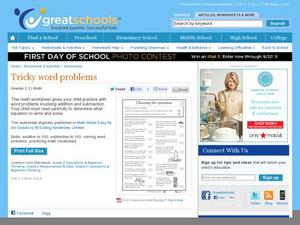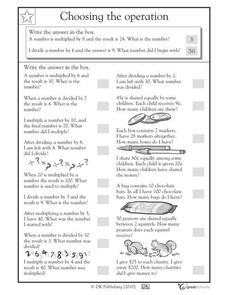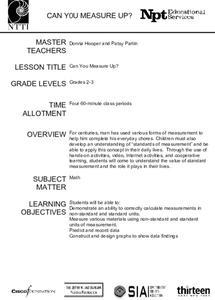Curated OER
Singapore Math and The Common Core
Tackle The Common Core math standards with some help from your friends in Singapore.
Curated OER
Wants and Needs
Here is an outstanding lesson plan on wants versus needs designed for 1st graders. Pupils listen to the book, Something Good which presents themes on wants, needs, choice, resources, and counting money. Pupils complete worksheets...
Curated OER
Barter vs. Money
First graders listen to the book, Sheep in a Shop, that leads them to think about making financial decisions, trading, and the barter system. After the book is read aloud, a discussion ensues about some of the things that the sheep...
Desert Discovery
Leaping Lizards
Here is a fine biology lesson that introduces youngsters to reptiles. They study their feeding habits, their habitats, and the adaptations they must make to survive in their environments. The outstanding lesson includes two excellent...
Oklahoma State University
A Hundred Bales of Hay
This instructional activity combines math, visual arts, and language arts activities that all focus on the making, and baling of hay. The activities can be adjusted to address different age ranges. Most of the activities focus on gaining...
Curated OER
Take Math Shopping!
Percents, estimation, and comparative analysis become more understandable when they are used in-context at the grocery store.
Curated OER
Count by 5's Teaching Idea
Creating while learning is great for visual, spacial, and kinesthetic learners. First graders can use the provided quilt squares to construct their very own count by 5 quilt. Each quilt square shows a picture of a hand with a 5s number...
Curated OER
Venn Diagrams
The Venn diagram is such a useful tool! It can be used to provide a visual when comparing things across the curriculum. In this case, learners consider three Venn diagrams that each have a unique set of things in them. They must answer...
DK Publishing
Tricky Word Problems - Choosing the Operation
Decipher the equations in these addition and subtraction word problems. Two examples at the top of the page guide second graders as they solve the rest of the problems. There is no space to write out the equation, but there is a place to...
DK Publishing
Real-life Word Problems, Part 5
Bring these four word problems to your second grade class to reinforce addition, subtraction, and money math. The problems provide space to write out the proper equations, as well as separate areas to fill in the answers. Use these...
Curated OER
Fairy Tales Come True
Pupils see how to solve math problems using place value. After watching an episode from Cyberchase, kids work together using hands-on materials to solve the problems given. This outstanding, ten-page lesson has everything you need to...
DK Publishing
Tricky Word Problems, Part 2 - Choosing the Operation
Can your learners figure out which equation to solve? Use this resource to challenge your third graders with word problems involving the four operations. Each problem has a section to write the answer, but pupils will need to write out...
DK Publishing
Number Sentences: Dividing by 4
Division can be a picnic! Given illustrations of picnic foods, such as sandwiches, drinks, and cupcakes, third graders practice their money math and division skills. Have them color the page when they're finished, or bring division to...
Curated OER
Go Fish!
Students share a bowl of goldfish crackers. For this lesson on sharing, students see how a limited resource goes furthest when it is evenly shared. Students are allowed to take as many crackers as they would like, and then in contrast,...
DK Publishing
Sorting Animals
How many legs does a lion have? What about a bird? How many legs does a snake have? A counting assignment prompts kindergartners to sort the animals by the amount of legs they have. After kids finish matching, they can color the animals...
Curated OER
Adapting the Game Concentration
I love classroom games, and this plan deftly describes how you can use the game Concentration across the curriculum to reinforce skills. I wish I would have thought of this when I was teaching this age level. These kinds of games are...
Curated OER
What Time is it?
Here is a nice presentation on time; how to read analog clocks and calculating elapsed time. The graphics, and problems posed in this PowerPoint are especially good. One nice feature is that students are encouraged to work together in...
Curated OER
Creating a Three sisters Garden
Students understand that a three sisters garden is comprised of corn, beans and squash. In this three sisters garden lesson, students understand that Native Americans planted three sisters gardens and grow a three sisters garden....
Curated OER
Lesson 6: Mittens, Socks, Mittens, Socks, Mittens!
Mittens and socks, two of my favorite clothing items! Young learners with special needs, explore clothing appropriate for cold weather. They identify both socks and mittens, discuss weather appropriate clothing, and listen to the story,...
Curated OER
Fish and Clips
Youngsters test magnetic strength by measuring the mass of paper clips that they "hook" with a magnet. Your first and second graders should love the hands-on activities associated with this plan. The reproducible materials are quite good...
DK Publishing
The Missing Numbers
Where are all the numbers? Scholars practice with number sequences in different formats as they fill in numerals. First, an analog clock face is missing four numbers. Next, they write in the next four digits in a single-digit sequence....
DK Publishing
Addition Fact Families
Fact families are an excellent way to connect math operations for beginners to addition and subtraction. Use the examples here to review this concept before scholars try these on their own. For each, they examine two related number...
Curated OER
Addition Properties
Addition becomes much simpler once scholars understand its properties. They examine the commutative property through five equation pairs. For each, the addends have been switched and scholars must fill one in. The next six problems give...
Curated OER
Can You Measure Up?
Here is a well-designed lesson on common standards of measurement for your young mathematicians. In it, learners calculate measurements in standard and non-standard units. They make predictions, record data, and construct and design...

























